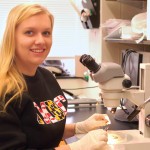 Q. Describe your research project and its significance in 100 words or less.
Q. Describe your research project and its significance in 100 words or less.
A. Vertebrate animals, such as mice have a unique accessory olfactory system which utilizes the vomeronasal organ (VNO) to detect pheromones and other semiochemicals. Stimuli enter the VNO in a liquid state and are detected by vomeronasal receptors in the VNO. Little is known about how constituent chemicals are monitored to control stimulus uptake. We are using transgenic mice to investigate the sensory regulation of particular cell types upon stimulus access. We use a fluorescent dye assay developed in our laboratory (Ogura et al 2010) to quantity stimulus uptake in the VNO. We seek to understand how the VNO optimizes sensory detection for social and sexual behaviors, and prevents chemical-induced damage.
Q. How long have you been working on this project?
A. I have been working on my project since the beginning of the summer and I look forward to continuing my research throughout the academic year.
Q. What do you like most about doing research?
A. One of my favorite aspects of research is the ability to connect what is learned in the class room to a meaningful hands-on experience. Research allows you to better understand and build upon the subjects learned and understand even why they were taught in class in the first place. As you become more immersed in a project you start to think deeper about the question you are researching and the implications of your findings. You begin to draw connections between your results and the science which explains them. Essentially you get to see the big picture and develop a new way of thinking which allows you see to become a better student.
Q. What do you like least about doing research?
A. Conducting research can be a very consuming process, in both time and energy. Research runs on its own time. Experiments often follow strict protocols which have specific time frames for when each step must be completed. Experiments do not always generate the results you may expect, so often times you must repeat experiments or even rethink the experiment as a whole. This process can be draining but often times very exciting and even lead you down a path you hadn’t predicted at the inception of a project.
Q. What are your career goals?
A. Currently, I hope to pursue a Ph.D. in either biochemistry or toxicology and pursue a career in biochemical forensics.
Q. What advice do you have for students who are trying to get into a research lab/group?
A. My advice to anyone trying to join a research group is to research. Find a subject you are interested in and investigate the research being conducted. Learn who help build the foundations and who is pushing the research into the future. Discover who you want to work with, learn about their research, read their papers, look at the work of both the graduates and undergraduates in the lab, and contact the principle investigators. Reaching out is the most important of trying to join a lab. Let them know you have similar passions and that you have done your research about their work.